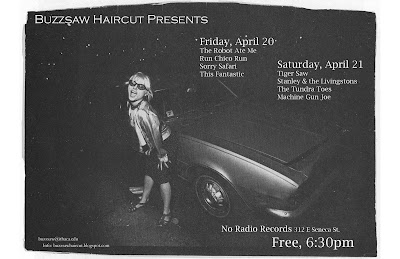 If Quentin Tarantino and Robert Rodriguez, the exalted directors of Grindhouse, know anything, they know crappy movies. Through some postmodern loophole, they are
If Quentin Tarantino and Robert Rodriguez, the exalted directors of Grindhouse, know anything, they know crappy movies. Through some postmodern loophole, they are The result is two “mini” (ninety minute) movies and a smattering of horror-movie-parody trailers that were lovingly directed by such schlock-and-gore fans as Rob Zombie, Edgar Wright (Shaun of the Dead) and Eli Roth (Hostel). Everything is exactingly in sync with a seventies drive-in double bill; even the film stock has been washed out and aged. In terms of atmosphere, Tarantino, Rodriguez and their cohorts are geniuses; one leaves feeling sociable and giddy.
The first feature, Rodriguez’s Planet Terror, culls all of the clichés from the now-hackneyed zombies-on-the-rampage genre: a small town setting, a well-intentioned hero with a past, military complicity, a liberal volume of blood spray, and an apocalyptic ending. This segment is not particularly memorable, but it was so overwrought and so full of cheesy dialogue that it never lost my attention; disposable movies such as this should just wash over you. The cast has all the right stock players – people that never have and never will become stars, and have since given up trying. Some, like Michael Biehn (the protagonist in the original Terminator plays a gruff sheriff here), and a tired Bruce Willis, are jokes in and of themselves.
Tarrantino’s flick, Death Proof, despite being full of horny girls and mean muscle cars, actually betrays its roots at times. An early scene at a bar, for example, could be the set-up for a more substantial film. To my surprise, the middle actually sagged. Tarantino, the writer, got indulgent; his attempts at characterization go nowhere and – worse – lack his trademark wit. There’s a very long take that spins around a group of girls at a table that seems like something out of Grand Illusion and not Vanishing Point. And there is a whole lot of build up for a stunt that seems comparatively unimpressive. But the movie zings when Kurt Russell is on screen as an old TV stuntman who likes to use his “death proof” car as a murder weapon for unsuspecting women. He goes between being a smooth but world-weary charmer while he’s on the winning side and an apoplectic wuss when he’s on the defensive. He finally harasses the wrong girls – themselves
Their car chase/dog fight is probably the best that I’ve ever seen on the big screen; I’d put it next to The French Connection without flinching. One friend likened watching it to getting high; the choreography, coupled with the feminist revenge fantasy – because you really want to see the murderous old chauvinist finally get his comeuppance – really leaves you feeling elated. It’s the perfect high note for Grindhouse to end on.
The beauty of this movie is that it's wholly loyal to what it’s doing; Rodriguez and Tarantino never try to elevate the material into what some critics mistake for “art.” This is empty, compelling popcorn entertainment, and the perfect movie-going experience. And unlike movies, such as 300, it's thoroughly witty and without a nauseating flair for propaganda.
-Elliott Feedore




